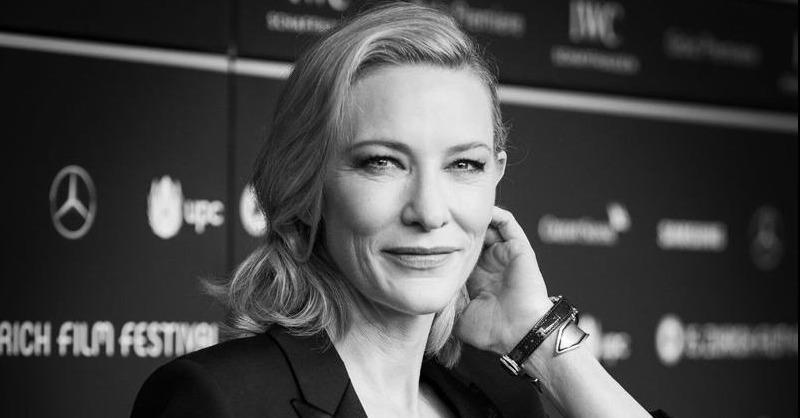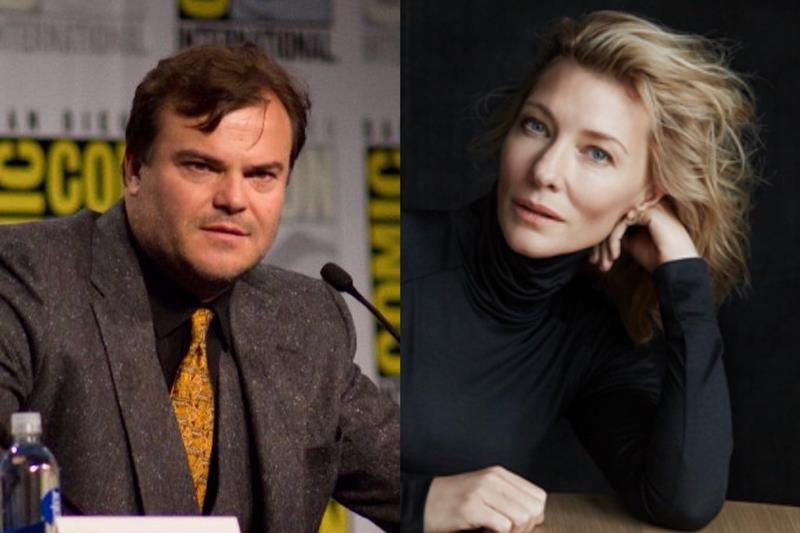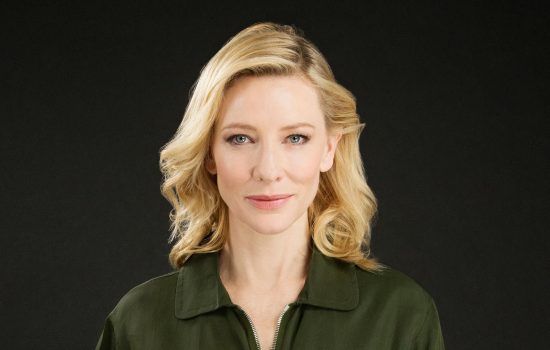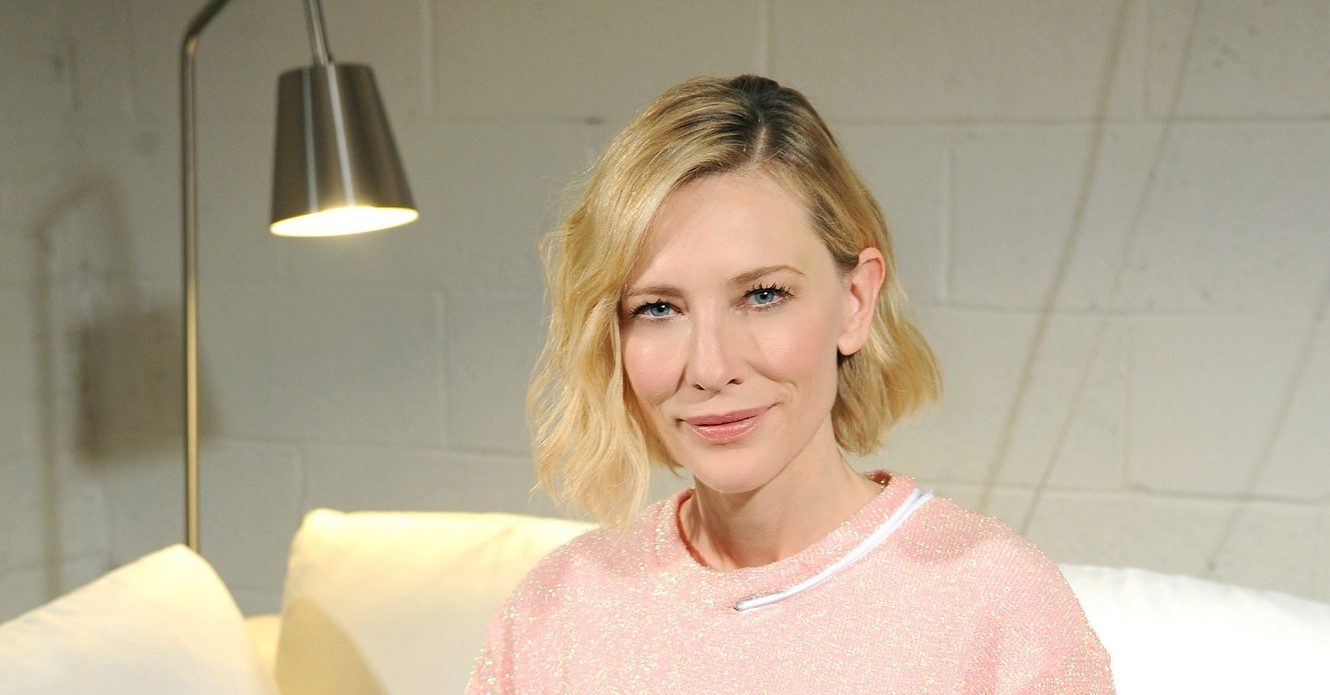Hello dear Blanchetters!
As you guys know, last September, Cate has been to Italy for Giorgio Armani dinner and during the event, she had an interview with Madame Figaro!
That interview has been published this week, and there were several questions she was answering about her life as an actress, beauty, style, inspirations and Feminism.
Also, there is another interview to Now To Love New Zealand.
Take a look at the new content below!!
Madame Figaro
La Giudecca, septembre dernier. Cate Blanchett vous attend dans une suite immense du Cipriani, avec vue imprenable sur Venise, l’île voisine, le canal et les églises. Le soir même, elle assistera à l’avant-première du Joker (c’était la Mostra) avant d’honorer de sa starissime présence un dîner pour Giorgio Armani Beauty, dont elle est l’égérie – elle est également le visage du parfum Sì.
Il n’existe pas aujourd’hui une star de cinéma qui fasse autant d’effet que Cate Blanchett, actrice remarquable, capable de se glisser dans la peau d’une reine ou de… Bob Dylan. C’est une femme à effet spécial, faite de blanc et d’or, le teint d’albâtre et la blondeur, les pommettes hautes et les yeux laser.
On pourrait la surnommer The Look, si ce terme n’était pas réservé pour l’éternité à Lauren Bacall. Les yeux de Cate Blanchett sont bleus et pénétrants, des yeux faits pour les close up, des yeux faits pour exprimer le désir, le bonheur, la détresse ou la folie, tout comme sa voix, ce timbre grave, puissant et profond, un timbre fait pour le théâtre, où elle est «née à l’art».
Bref, sa beauté un peu étrange convoque à elle seule tout un imaginaire hollywoodien qu’on pense englouti – Greta Garbo, Bette Davis, Katharine Hepburn – mais d’une modernité implacable : actrice «globale», elle est partout, virevolte entre films d’auteur (Carol, de Todd Haynes) et blockbusters (Le Seigneur des anneaux), biopics (une de ses spécialités – elle va bientôt incarner Lucille Ball pour Amazon), ne redoutant pas les rôles à risques, qu’elle parfume de son exceptionnelle expressivité.
À l’affiche de Bernadette a disparu, de Richard Linklater (sortie début 2020), Cate Blanchett vient de terminer une mini-série TV qu’elle a coproduite, Mrs. America, où elle joue Phyllis Schlafly, une activiste américaine réactionnaire et antiféministe des années 1970. En bref, un contre-emploi.
Actrice
«Je suis née à Melbourne, mon père était texan et ma mère australienne. Juste avant d’entrer à l’université, j’ai choisi de voyager pendant un an. En Italie, je dormais dans des couvents, j’étais fascinée par les nonnes. Lorsque je suis revenue à Sydney, j’avais découvert ma vocation : le théâtre. Devenir actrice m’a stabilisée. Le mystère et l’imprévisibilité de ce métier me conviennent bien.»
Beauté
«Venant du théâtre, où le glamour n’est pas une priorité, je n’ai jamais pris en considération cette beauté qu’on m’attribue aujourd’hui, je n’y pensais même pas. Je n’ai plus 20 ans, j’ai pris de la distance avec tout ça et, de toute façon, le physique n’a jamais été ma carte de visite. La beauté conventionnelle présente assez peu d’attraits à mes yeux. Ce qui m’intéresse, c’est de rendre séduisant, ou acceptable, ce que je possède en moi.»
Style
«J’étais une adolescente brouillonne et assez terrifiée par les filles sophistiquées. Mais le style, c’est un contexte : il évolue, s’adapte, répond à l’environnement. Je suis très attentive et très inspirée par les références picturales, par l’esthétisme, par la beauté. J’aime les gens uniques. Regardez Frida Kahlo : il en a existé une et une seule. Ma définition du style ? Irrévérence, transgression et détachement. Le style ne doit pas être trop travaillé ou conscient, car le contrôle est l’ennemi de la beauté.»
Inspirations
«Les femmes qui m’impressionnent sont au-delà de la beauté : elles sont intenses. Je pense à Maggie Smith, Judi Dench, Liv Ullmann ou Charlotte Rampling. Je pense à Bette Davis dans Eve ou à Katharine Hepburn dans Sylvia Scarlett. À Judy Davis, formidable actrice australienne. Mais aussi à Cindy Sherman ou Georgia O’Keeffe. Je pense aussi à Katharine Graham, qui a dirigé le Washington Post. Des femmes remarquables qui ont fait bouger les lignes…»
Féminisme
«Nous perdons du terrain. Nous avons progressé de façon spectaculaire jusqu’aux années 1970, celles de l’émancipation, et depuis il y a beaucoup de signes d’un retour en arrière. L’égalité entre les hommes et les femmes ne devrait même plus être l’objet de discussions ou de débats. Nous les femmes, nous représentons la moitié de la population de la terre. Dans le monde du cinéma, la sous-représentation reste flagrante, même si un changement profond s’est produit : nous ne sommes plus silencieuses et nous avançons, je crois, dans la même direction. »
Some answers from the Madame Figaro interview are translated to English below:
Actress
“I was born in Melbourne, my father was Texan and my mother was Australian. Just before entering university I chose to travel for a year. In Italy, I slept in convents, I was fascinated by the nuns. When I came back to Sydney, I discovered my vocation: Theatre. Becoming an actress stabilized me. The mystery and unpredictability of this job suit me well.”
Beauty
“Coming from theatre, where glamour is not a priority, I have never considered the beauty that is attributed to me today, I did not even think about it. I am over 20 years old, I’ve been getting away from it all, and in any case, the physical has never been my business card. Conventional beauty has few attractions for me. What interests me is to make seductive, or acceptable, what I have in me.”

Style
“I was a scrambled teenager and quite terrified by sophisticated girls. But style is a context: it evolves, adapts, responds to the environment. I am very attentive and very inspired by pictorial references, by aesthetics, by beauty. I like unique people. Look at Frida Kahlo: there was one and only one. My definition of style? Irreverence, transgression and detachment. The style should not be too worked or conscious, because control is the enemy of beauty.”
Inspirations
“The women who impress me are beyond beauty: they are intense. I think of Maggie Smith, Judi Dench, Liv Ullmann or Charlotte Rampling. I think of Bette Davis in Eve or Katharine Hepburn in Sylvia Scarlett. To Judy Davis, a wonderful Australian actress. But also to Cindy Sherman or Georgia O’Keeffe. I am also thinking of Katharine Graham, who headed the Washington Post. Outstanding women who moved the lines … ”
Feminism
“We are losing ground. We have progressed dramatically until the 1970s, those of emancipation, and since then there are many signs of a retreat. Equality between men and women should not even be the subject of discussion or debate. We women, we represent half of the population of the earth. In the world of cinema, the under-representation remains flagrant, even if a profound change has occurred: we are no longer silent and we are moving, I believe, in the same direction. ”
Magazine Madame Figaro

Interview Now to Love
If you are scandalized by the notion of an unfaithful-to-the-book film adaptation, you might not get along with Cate Blanchett.
“Why even bother?” she said recently, of films that take little to no creative liberties. “The only reason to turn something from a book to the screen is if you’ve got something more to say.”
The actress was being asked about her starring role in Where’d You Go, Bernadette? Based on Maria Semple’s best-selling book of the same name, the movie, which hit theatres earlier this year, tells the story of an agoraphobic architect wrestling with her own wasted potential as her daughter, for whom she put her career ambitions aside, prepares to leave home for university.
The restrictions of the medium mean the film’s plot necessarily diverges from that of the novel.
“But it’s tangentially fascinating,” reasons Cate, whose true-blue Aussie background mitigates the pretentiousness of her frequently over-the-top turns of phrase. “It’s not a replication because the novel exists!”
Cate, it’s fair to say, doesn’t do replicas. Having shot to fame playing Queen Elizabeth I in 1997’s Elizabeth and fearful of being typecast, the now 50-year-old actress turned down a number of period films in the years that followed, explaining that in rehashing “pre-masticated versions” of previous roles, “there was no potential for discovering anything new. There was no risk.”
This is not to say there’s no common thread in the roles she’s taken on since. “Malice and mania” is how one journalist described it. “The King Lear end of the spectrum” is how it’s summed up by Cate herself.
We might instead comment on the ‘complexity’ of characters like Elizabeth’s headstrong virgin queen, Notes on a Scandal’s cradle-snatching high school teacher, Carol’s bi-curious housewife, and Blue Jasmine’s socialite brought low.
Gripped by creative failure and, according to Cate, “experiencing the kind of identity crisis that comes with recognising this enormous gulf between who she thinks she was and who she really is”, Bernadette is yet another highly complex character.
“She’s got this relentless negativity that’s acerbic and hilarious and slightly unhinged,” she explains, pointing out that anyone who’s made professional sacrifices for the sake of family will relate to Bernadette’s despair, and the drastic decisions born from it.
“We all have a certain image of ourselves and we’re all clinging to a particular perception of ourselves that is different from the reality.”
You might think it’s a generous ‘we’ – secretly denoting ‘you and I’, not ‘she’ of the double Academy Award winner, worth $134 million, who has been happily married for 22 years with four children.
But as it happens, Cate is no stranger to a career-centred existential crisis. She certainly said as much to fellow A-Lister Julia Roberts, who in a piece for Interview earlier this year, elicited from Cate an admission that Bernadette’s “creative shut-down” resonated deeply.

Question time
It arose, however, that the trigger for Cate wasn’t exactly creativity or a lack thereof. Instead, questions of deeper fulfilment and its sources were raised and debated, with the Australian saying to the American, “When you’re inside a richly lived life, you suddenly think, ‘Do I need to pretend to live inside these other experiences?'”
Without dismissing her career and the associated experiences that have added to the richness of her life (one of her happiest days was spent kayaking in Greenland, shooting scenes for Bernadette), she makes it clear that acting means taking the good with the bad. And that ‘the bad’ isn’t something she is willing to put up with forever.
“When I was younger,” she told Julia, “I would wonder why the older actors I admired kept talking about quitting. Now I realise it’s because they want to maintain a connection to their last shreds of sanity.
As I get older, I ask myself if I still want to submit to the shamanistic end of this profession and go completely into madness… I’m on the proverbial couch thinking, ‘Do I want to go in that direction, or do I actually want to live?'”
There’s no question of what the family-oriented actress would do were she to give up the craft and make ‘living’ her sole focus. But first, a brief history: Having begun her acting career in Sydney, where she met and married fellow thespian Andrew Upton, Cate relocated to the UK in the late ’90s to pursue the parts – including Elizabeth – that would make her a star of international proportions.
Then, in 2006, when Andrew was invited to take over as artistic director of the Sydney Theatre Company, the couple returned down under, and Cate spent what she calls “the most enjoyable six years of [her] career” working and raising their young family in an eco-friendly mansion in the North Sydney suburb of Hunters Hill.
Family happiness
When work opportunities called them back to the UK in 2016, purchasing an idyllic piece of real estate in rural Sussex complete with a lawn and a lake was a no-brainer. It’s from here that Cate and Andrew have continued to raise sons Dashiell, 17, Roman, 15, and Ignatius, 11, as well as daughter Edith, four, who they adopted in 2015. “It wasn’t about biology,” Cate explained to the Daily Telegraph. “We felt we had space, enough emotional room in our hearts and we’re privileged enough to have the capacity to have another child.”
A big proponent of ‘having it all’, she likes her children to see her working. It is, however, important to her to be a highly-engaged parent which, by celebrity standards, means opting into the tasks she could presumably delegate – school drop-offs and pick-ups; making her kids’ lunches; cooking the family dinner.
At times, ingredients are a bone of contention. A vegetarian for a number of years, Cate says her “Machiavellian” plan to turn her children off meat by adopting two pet piglets was a huge failure.
“I explained to them that if they wanted to eat bacon or sausages, that’s where it would come from. They were fine with that and I was horrified!”
But despite having spent “a lot of time running away from being an actor”, it transpires that Cate, unlike Bernadette, has enough creative outlets to keep her in the game for the time being.
She recently remarked that her work with visual artists and choreographers was “more rewarding at the moment than the cookie-cutter projects” – a hangover, perhaps, from helping her husband helm the STC, where she developed a taste for running the show.
This doesn’t mean she’s relegating herself to standing behind the camera, or even swearing off big blockbuster films. And in fact, come 2020, she’s set to appear on the small screen for the first time, playing conservative commentator Phyllis Schlafly in FX’s Mrs America.
A nine-episode limited series about the rise of feminism in the 1970s and the push for the Equal Rights Amendment (ERA), of which the anti-feminist was a key opponent, the production is already attracting positive attention from critics.
With women’s rights issues a hot topic in today’s America where, due in large part to the work of Phyllis, the ERA remains unratified, the show’s subject matter rings close to home.
Cate – who is also an executive producer on the project – says that the opportunity to “peel back the layers of this recent period of history” couldn’t have come at “a more appropriate time”.
Sisterhood in film
Time, after all, is up. Somewhat controversially, you won’t find Cate making specific statements about the movement’s major targets. Reluctant to wade in on Harvey Weinstein or Woody Allen, who directed her in Blue Jasmine and who continues to deny the abuse allegations levelled at him by his own daughter, she argues that contributing to the “white noise” already before the courts would be “unhelpful to the goal [she is] ultimately interested in,” which is to see justice served.
She does, however, speak positively about how the #TimesUp and #MeToo movements have enabled women to rewrite the power structure. “It’s a matriarchy,” she said to Julia Roberts about the current sense of sisterhood in the film industry and beyond.
“It’s not about competition – it’s about collaboration.” Recounting to Harper’s Bazaar the tale of a male director who pitted female cast members against one another in what she calls a “classic divide and conquer”, she notes that such an approach wouldn’t fly any more, “because women are talking… that’s the biggest, most profound change I’ve felt. It’s shifted things in a really permanent way.”
She adds that with more women in the writers’ room, we can expect more female-centred narratives.
“These characters are being placed in very interesting backdrops and the stories that are being told about them are more sophisticated and complex,” she told Vogue UK in March.
Just as they did at the very start of her career, complex women, it seems, will continue to intrigue and inspire Cate into the future – and not just from an acting perspective, but from an ageing one, too.
“I don’t think about ageing at all until someone brings it up,” she said in the same Vogue UK interview. “When I think of some of the faces that inspire me most, it’s Louise Bourgeois and Georgia O’Keeffe. I’m looking into the spirit of the woman and that’s what I love.”
Yes, she’s realistic about how getting older will impact her work.
“You can’t hope to be of relevance to every generation,” she says. But when it comes to the experience she brings to the table, it occurs that age is, in a sense, Cate’s biggest asset.
And if Bernadette is your touchstone? It’s safe to say she isn’t going anywhere.









 A Manual for Cleaning Women (202?)
A Manual for Cleaning Women (202?) Father Mother Brother Sister (2025)
Father Mother Brother Sister (2025)  Black Bag (2025)
Black Bag (2025)  The Seagull (2025)
The Seagull (2025) Bozo Over Roses (2025)
Bozo Over Roses (2025) Disclaimer (2024)
Disclaimer (2024)  Rumours (2024)
Rumours (2024)  Borderlands (2024)
Borderlands (2024)  The New Boy (2023)
The New Boy (2023) 











